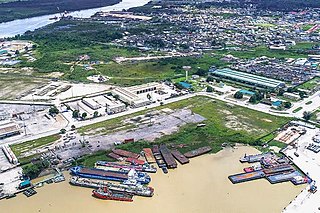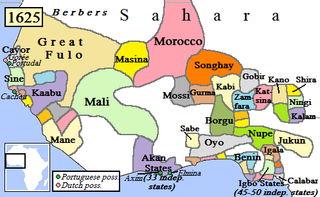Related Research Articles
The Benin Expedition of 1897 was a punitive expedition by a British force of 1,200 men under Sir Harry Rawson in response to the ambush of a previous British party under Acting Consul General James Phillips, of the Niger Coast Protectorate. Rawson's troops captured and sacked Benin City, bringing to an end the Kingdom of Benin, which was eventually absorbed into colonial Nigeria.

The city of Warri is an oil hub within South-South Nigeria and houses an annex of the Delta State Government House. Warri City is one of the major hubs of the petroleum industry in Nigeria. Warri and her twin city, Uvwie are the commercial capital of Delta State with a population of over 311,970 people in 2006. The city is the indigenous territory of Urhobo, itsekiri and Ijaw people.
Macgregor Laird was a Scottish merchant pioneer of British trade on the River Niger. Laird's commercial expedition between 1832 and 1834 to navigate the Niger and initiate trade between Europeans and Africans northwards of the coast was considered a failure, majority of the passengers died and the volume of trade realized was minimal. However, his experience provided information about the design of vessels suitable on the Niger and the various settlements in the interior of the Niger Delta.

The Royal Niger Company was a mercantile company chartered by the British government in the nineteenth century. It was formed in 1879 as the United African Company and renamed to National African Company in 1881 and to Royal Niger Company in 1886. In 1929, the company became part of the United Africa Company, which came under the control of Unilever during the 1930s and continued to exist as a subsidiary of Unilever until 1987, when it was absorbed into the parent company.

The Niger Coast Protectorate was a British protectorate in the Oil Rivers area of present-day Nigeria, originally established as the Oil Rivers Protectorate in 1884 and confirmed at the Berlin Conference the following year. It was renamed on 12 May 1893, and merged with the chartered territories of the Royal Niger Company on 1 January 1900 to form the Southern Nigeria Protectorate.
This is a survey of the postage stamps and postal history of the Niger Coast Protectorate.

Northern Nigeria was a British protectorate which lasted from 1900 until 1914 and covered the northern part of what is now Nigeria.

Southern Nigeria was a British protectorate in the coastal areas of modern-day Nigeria formed in 1900 from the union of the Niger Coast Protectorate with territories chartered by the Royal Niger Company below Lokoja on the Niger River.

The Eastern Region was an administrative region in Nigeria, dating back originally from the division of the colony Southern Nigeria in 1954. Its first capital was Calabar. The capital was later moved to Enugu and the second capital was Umuahia. The region was officially divided in 1967 into three new states, the East-Central State, Rivers State and South-Eastern State. East-Central State had its capital at Enugu, which is now part of Enugu State.
The United Africa Company of Nigeria is a Nigerian publicly listed company based in Lagos. Its areas of operation include manufacturing, services, logistics and warehousing, agricultural and real estate. UACN's food operations include UAC Franchising, UAC Restaurants and UAC Dairies. It also has equity stake in UACN Property Development Company, a quoted firm, CAP Plc, makers of Dulux paints and Portland Paints, manufacturers of Sandtex paints.

King Jaja of Opobo was the first king (amanyanabo) of Opobo. He was also the founder of Opobo city-state in present day Rivers State of Nigeria. Born in Umuduruoha Amaigbo in present-day Imo State, his actual birth date, as well as his birth parents, is unknown. At an indeterminate date, Jaja was kidnapped and sold into slavery. He was then brought to Ijawland thereafter.
Sapele is a town and one of the Local Government Area in Delta State, Nigeria.

Colonial Nigeria was ruled by the British Empire from the mid-nineteenth century until 1960 when Nigeria achieved independence. British influence in the region began with the prohibition of slave trade to British subjects in 1807. Britain annexed Lagos in 1861 and established the Oil River Protectorate in 1884. British influence in the Niger area increased gradually over the 19th century, but Britain did not effectively occupy the area until 1885. Other European powers acknowledged Britain's dominance over the area in the 1885 Berlin Conference.

Nana Olomu (1852–1916) was an Itsekiri chief and merchant from the Niger Delta region of southern Nigeria. He was the fourth Itsekiri chief to hold the position of Governor of Benin River.

Nigerian traditional rulers often derive their titles from the rulers of independent states or communities that existed before the formation of modern Nigeria. Although they do not have formal political power, in many cases they continue to command respect from their people and have considerable influence in their community.

The Nembe Kingdom is a traditional state in Niger Delta. It includes the Nembe and Brass Local Government Areas of Bayelsa State, Nigeria. The traditional rulers take the title "Amanyanabo". Today, leadership is split between the Amanyanabos of Ogbolomabiri, Bassambiri, Okpoama, Odioama and Twon Brass.

Chief Oko Jumbo was an important chief in the Kingdom of Bonny, a state in the Niger Delta, now part of Rivers State, Nigeria. For many years in the 19th century he was the effective ruler of Bonny.

Jantzen & Thormählen was a German firm based in Hamburg that was established to exploit the resources of Cameroon. The firm's commercial and political influence was a major factor in the establishment of the colony of Kamerun in 1884.

Nigerian nationality law is regulated by the Constitution of Nigeria, as amended, and various international agreements to which the country is a signatory. These laws determine who is, or is eligible to be, a national of Nigeria. The legal means to acquire nationality, formal legal membership in a nation, differ from the domestic relationship of rights and obligations between a national and the nation, known as citizenship. Nationality describes the relationship of an individual to the state under international law, whereas citizenship is the domestic relationship of an individual within the nation. Commonwealth countries often use the terms nationality and citizenship as synonyms, despite their legal distinction and the fact that they are regulated by different governmental administrative bodies. Nigerian nationality is typically obtained under the principal of jus sanguinis, i.e. by birth to parents with Nigerian nationality. It can be granted to persons with an affiliation to the country, or to a permanent resident who has lived in the country for a given period of time through naturalisation.
Richard and William King Ltd was an English merchant company founded by the brothers William and Richard King in Bristol. Both brothers had previously been partners with their father, Thomas King. The initial partnership bought a 158-ton sailing ship named John Cabot to trade but it was later abandoned in Freetown after too much leakage.
References
- 1 2 3 Burns, Frederick Pedler ; with a chapter by Alan (1974). The lion and the unicorn in Africa : a history of the origins of the United Africa Company 1787-1931. London: Heinemann Educational. pp. 70–80. ISBN 0435326805.
- ↑ Rotimi, Kemi; Ogen, Olukoya (2008). "Jaja and Nana in the Niger Delta region of Nigeria: proto-nationalists or emergent capitalists". Journal of Pan African Studies. 2 (7).